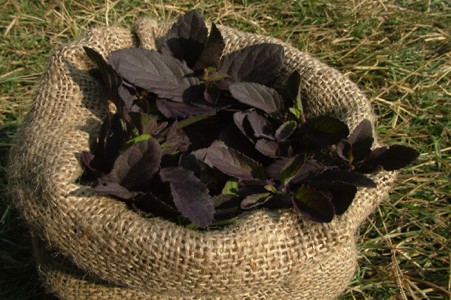By Nadia Marshall
One of my favourite presentations at the Melbourne Ayurveda Conference a few years back was Professor Marc Cohen's talk on Tulsi, also known as Holy Basil. Professor Cohen pointed out that in our culture, we tend to follow a cycle of uppers, stayers and downers. We drink caffeine to get us going, we add sugar to keep us going, then we drink alcohol to chill us out.
Basically we seek stimulation, stamina and then sedation... all day, every day.
But caffeine, sugar and alcohol, in excess, aren't exactly great for our health. So what to do? There's no getting around the fact that we're going to keep seeking these three things to help us through our busy lives. But can we find this support in a form that isn't just helpful but healthful as well?
Yes we can! Tulsi provides this support by offering all three of these effects without putting your system out of balance or giving it more to cope with. In fact, it offers not just support but also protection and rejuvenation!
So here are 5 pretty good reasons to drink Tulsi tea daily... or even several times a day.
1) Tulsi is stimulating
Tulsi is stimulating, but not in a coffee kind of way. Rather than being Rajasic or agitating to the body/mind, it is Sattvic so is enlivening and 'imparts the [qualities] of lightness and spiritual clarity' to the system, according to Sebastian Pole. Pole points out it is also a mild nervine so helps to 'heighten awareness and mental clarity'. It will wake you up, brighten you up and will facilitate creativity...
Tulsi is also a warming stimulant for the metabolism. It improves digestion, assimilation and absorption and supports healthy liver function. Given the liver is our busiest metabolic organ, this is good news. The other great news is... Tulsi acts directly on fat tissue so helps to reduce weight, if it needs reducing.
2) Tulsi increases stamina
Another word for stamina is energy. We usually think of energy as something we take in and then use up... but how is deep, enduring energy really supported in the body? From a western perspective, healthy lungs that take in ample oxygen, a healthy heart that efficiently moves this oxygen and other nutrients around the body and a healthy pancreas and liver to help regulate our blood sugar and hormonal levels would certainly help. Tulsi assists all of these.
Tulsi's main action is on the respiratory system - it clears congestion in the lungs, improves breathing and reduces coughing. It is great for asthma, bronchitis, respiratory allergies, coughs and colds... but also for just regular breathing and infusing the body/mind with fresh Prana or lifeforce. Tulsi also has a special affinity for the heart. It is a cardiac stimulant, improves circulation, reduces high blood pressure and again, helps to clear congestion so also reduces cholesterol levels. Finally, Tulsi helps the pancreas to function well and can be used to reduce blood sugar and improve insulin sensitivity. Hallelujah!
From an Ayurvedic perspective, stamina is provided by an ample supply of not just Prana but also Ojas or the subtle essence of water in the body. Ojas can also be thought of as the foundation of our immune system and is supported by good digestion and a calm mind... because nothing leaks Ojas like excessive Rajas or agitation. Tulsi supports the formation of Ojas through promoting strong metabolism, by strengthening immunity and by calming the mind... which brings us to our next point.
3) Tulsi is calming
The latin name for Tulsi is Ocimum Sanctum-Folim. Sanctum means 'holy' and Tulsi is, indeed a very sacred plant. In fact, it is revered in Hinduism and many Indian households worship Tulsi, offer it to the Gods and have a Tulsi plant growing at the front of their house. Tulsi is high in the quality of Sattva which means it helps to promote calm, stillness and clarity in the mind.
This isn't just outlined in ancient Ayurvedic texts, it has been scientifically verified. Tulsi has been shown to significantly reduce stress, anxiety disorders and depression due to its cortisol-balancing effect. It has also been shown to relieve inattention, forgetfulness and feelings of exhaustion and help with sleep problems. And, is it great for preventing headaches caused by high tension or congestion. I should be living on the stuff!
Tulsi also facilitates the downward movement of vata, known as apana vata. Apana vata is one of the most important winds of the body. But it also tends to be the most out of balance in our society... always being drawn upwards by our agitated minds and excessive thinking. Well-functioning apana vata helps to calm the mind, facilitates the elimination of wastes and is particularly important for women's health.
4) Tulsi is rejuvenative
Tulsi is an adaptogenic herb. This means it is considered a balancing, restorative, tonifying, protective herb. Basically, adaptogens help the body cope with stress, enhance physical and mental health, and promote longevity. They are highly revered by traditional medical systems. Other adaptogens you may be familiar with include Panax Ginseng, Astragalus, Licorice and Ashwagandha.
Tulsi is rejuvenative for all of the reasons outlined above. It rejuvenates us from the inside, out! Tulsi has an affinity for the skin and alleviates skin disorders (such as eczema, acne or fungal infections) due to it's blood purifying effect and anti-microbial, anti-inflammatory properties. It's truckload of anti-oxidants help mop up wrinkle-causing free-radicals and it can also help with itchy scalps, dandruff and even hair-loss (by mixing Tulsi powerder with coconut oil).
It's also great for oral and dental hygiene, killing nasty bacteria in the mouth and promoting healthy teeth and gums and fresh breath. So it doesn't just make you feel great, it helps you look good too.
5) Tulsi is protective
Did you know that thousands of Tulsi plants have been planted around the Taj Mahal to protect it from deterioration due to environmental toxins and air pollution? How wonderful!
And, Tulsi has the same effect on our bodies, helping to detoxify environmental chemicals from our systems, protecting us from microbial infections and even cancer, due to its anti-carcinogenic properties. It even protects us from radiation! Professor Cohen has stated that, "of the plants with radio-protective properties, Tulsi is the most studied. Various studies have found that Tulsi's radio-protective effects include reducing oxidative and chromosomal damage."
All this from a humble shrub from the mint family...
How to Drink Tulsi Tea
So hopefully I've convinced you it's worth swapping at least one of your regular coffee or tea breaks with a Tulsi tea break instead? I've convinced myself at least!
So how do you prepare it? If drinking tea prepared from fresh Tulsi leaves, it's best to choose Black Tulsi (also known as Krishna Tulsi with leaves that are darkish purple in colour - pictured above) as this is the more medicinal variety. Pop 3-5 leaves in a mug, add hot water and let it steep for 3-5mins. It will taste like an interesting combo of mint, basil and pepper... but is subtle and delicious.
Tulsi is as easy to grow as basil (it likes warm, sunny positions) and is readily available so ask your local nursery if they sell it and pop one in a pot for constant access to fresh Tulsi! You can also buy them online from www.allrareherbs.com.au. In addition to drinking it, you can enjoy Tulsi on your food or just nibble on a couple of leaves each day.
If you're more of a teabag person, I highly recommend the Tulsi tea range produced by ORGANIC INDIA. They are an amazing social enterprise company growing organic Tulsi in India and doing wonderful things for Indian agriculture and communities. They have many blends to choose from that are widely distributed, so you'll probably find them at your local supermarket. If you'd like to know more about what they do, check out their website at www.organicindia.com.au.
I'd like to finish with some words from Professor Cohen. He has found in his research that tulsi is credited with,
"giving lustre to the complexion, sweetness to the voice and fostering beauty, intelligence, stamina and a calm emotional disposition."
Yes please!
I hope you enjoy you're Tulsi tea as much as I am...
PLEASE NOTE: As with all herbal medicines, more is not always better. You can overdo your Tulsi intake as you can everything else so as usual, moderation is advised... especially if you're on blood thinning medication, if you're diabetic or if you're pregnant or trying to get pregant (for men as well as women). If you're in any doubt, it's a good idea to double check with your Doctor or Ayurvedic Practitioner for any contraindications.
References:
"Tulsi Holy Basil Herbal Guide", Organic India free Ebook
"Ayurvedic Medicine" by Sebastian Pole
"Ayurvedic Pharmacology & Therapeutic Uses of Medicinal Plants" by Vaidya VM Gogte
http://www.greenmedinfo.com/blog/ultimate-herbal-traveling-companion-tulsi
Bhattacharyya, D., T. K. Sur, et al. (2008). "Controlled programmed trial of Ocimum sanctum leaf on generalized anxiety disorders." Nepal Medical College journal
http://www.dnaindia.com/health/report-top-10-health-benefits-of-tulsi-1876745
http://www.vogue.in/content/this-indian-powerhouse-herb-could-be-the-secret-to-a-long-life/
5 Reasons to Drink Tulsi Tea Daily



